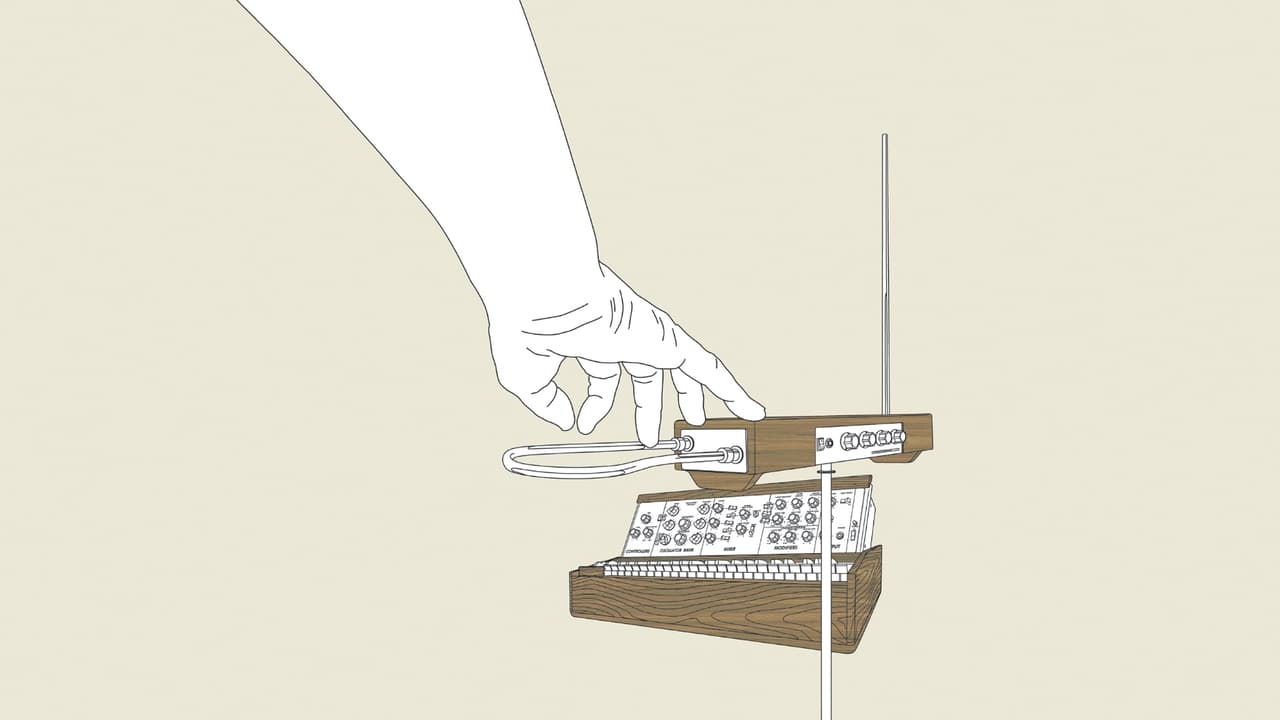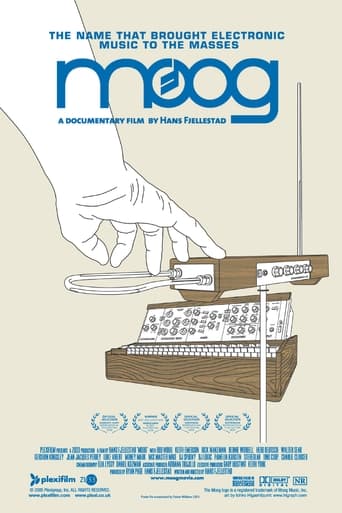



That was an excellent one.
Am i the only one who thinks........Average?
a film so unique, intoxicating and bizarre that it not only demands another viewing, but is also forgivable as a satirical comedy where the jokes eventually take the back seat.
View MoreThe film may be flawed, but its message is not.
Others have said it in other comments and I have to agree with them. Moog was an extremely important man in the world of electronic music and he really deserved a better tribute than this rambling mess of clips. The film maker never gets to grips with the guy in any way, shape or form but what I find more frustrating than anything is his choice of music to represent the moments in history. Perhaps he was on such a low budget that he couldn't afford certain rights but when Bob Moog talks about 'Switched on Bach' as being a ground breaking album, changing the public perception of what electronic music could offer, there isn't one single note from the album played. There's not even the mention of the composer's name. How can you have a documentary about Moog and not even mention the name Walter Carlos ? Quite unbelievable. The 'Switched on Bach' moment is quickly passed over for some reason and rushes into a short Keith Emerson clip. I also seem to remember that Tangerine Dream are never mentioned or any of their music played. All in all there are so many holes in the production it limits both its appeal and historic interest. Shame really because it queers the pitch for someone else who may want to do the job properly.
View MoreI must say that this documentary is a rather poor tribute both to Robert Moog and the Moog synthesizer for a myriad of reasons. Perhaps you might watch this (as it is being aired this month, December, 2007 on The Movie Channel (HD) for the same reason that I did (and that is to see what this documentary had to say about the man and his instrument, philosophy and some of the history behind the Moog synthesizer's and company's development), however the total impact of this piece greatly suffers both from what was included in the film and what was left out.Granted, it is obvious that this film was not intended to be a complete historical review of the Moog's development. The same applies to the music, musicians, interviews and other footage including Robert Moog's own comments about himself, his instrument, and those who used the instrument commercially or in performance. The soundtrack is also quite disappointing, especially in terms of what was chosen as representative examples of Moog performances over the years. I suppose you would have to be well-versed in the history of the synthesizer (as I am) to fully understand this.I agree with other reviewers in that Walter/Wendy Carlos was only briefly mentioned during this documentary, especially when it applies to the Moog modular system (as recorded on Switched-On Bach, The Well-Tempered Synthesizer, Switched-On Brandenburgs, Tron and others) which were perhaps the first and most influential recordings of the Moog synthesizer of all time. Also missing were such artists as: Isao Tomita, Dick Hyman, Herbie Hancock, Tony Banks (Genesis), and many more who recorded and performed with the Moog synthesizer during its early years. Instead, the focus of the piece centered around Keith Emerson, Rick Wakeman, Bernie Worrell and some of the early partners and friends who worked with Moog towards its development (Herbert Deutsch and other contemporaries and personal friends of the late Dr. Moog). The interview with Wakeman and Worrell was taped in a noisy hallway and could have been more effective (at the very least) by being taped in a quieter setting.The commercial use of the Moog synthesizer centered around a rather dated beer commercial. I was expecting perhaps an interview with Suzanne A. Ciani who was infinitely more prominent in this area. In other cases, the interview location (city) was titled, but not the name of the person speaking with Bob Moog and that was also disappointing.I also agree that certain comments were repeated, especially Bob's comment on having a feel of what was going on within the Moog's circuitry when he played it. Since he also discussed the Theremin (which seemed to be a major portion of this documentary) it would have nice to included some commentary about Miklos Rozsa and the role the Theremin played as the only recognized synthesizer as an "orchestral instrument." I am referring to many film score recordings which featured the Theremin, such as Hitchcock's Spellbound and many others in the suspense and Sci-Fi genres. There was little discussion about the other Moog synthesizer models outside of the modular system and the MiniMoog (such as the PolyMoog, MemoryMoog, and others).The in-between footage, music and performances were rather disappointing and disjointed. I think the director could have planned a better tribute to a wonderful person, inventor, instrument, social and historically-significant musical technology. I think to really do justice to both the man and his machine, you would have to present, at the very least, about a 2 to 3-hour-long documentary.On the plus side, it was interesting to see the Moog in production and some of the performance and interview footage, but not all. Actually, much of the footage is somewhat comical in nature when you look back at how it was presented, back in the early days of synthesis.
View MoreThe film was reasonably well filmed and reasonably edited and it's great that there is now a film out there about a synth pioneer.However my first thoughts on watching this film are: It repeats itself far too many times. It only needed to mention that Moog synths were first used for experimental music and adverts once. It only needed to show Bob Moog with his garden once! And there only needed to be one section on his philosophies on life and synthesisers.There were massive sections of the Moog story missing. What about the first fall of Moog Music in the early 80s and the Moog Liberation (the first guitar synth - only problem was it was too heavy to hold!) He only touched on his feelings about digital synthesisers. What about the 80s and the DX7 and Moog synths falling massively out of favour. What about the comeback in the 90s - initially selling his analogue circuit designs to other companies, who produced synths like the MIDI Moog and the SE ATC1. What about his FX pedals? Finally the soundtrack left much to be desired. All the live performances were badly recorded, the synths were far too loud compared to the backing. I know the synth was the instrument being demonstrated, but I found it uncomfortable to listen to. The content of the music was nearly all progressive rock musicians and various lesser known modern electro acts (bar stereo-lab and DJ spooky). He only mentioned Walter/Wendy Carlos in passing, he/she was the most important thing to happen to him and there was no interview or audio clip!! What about electropop, which was founded on the early affordable synths like the Moog Prodigy? These are just the first 2 genres that spring to mind that were missing - I could go on! So all in all - it's great that there is now a film about this fascinating guy. But...Hans Fjellestad should have got all the raw materials together before doing it. Get interviews with ALL the relevant people and use a soundtrack that is more diverse.
View MoreI enjoyed watching this homage to the synthesizer inventor and all round nice guy Bob Moog but spent hours afterward discussing ways this documentary could have been better. That's not to say there's all that much wrong with it except that it suffers from a genuine lack of archive footage. Bob was building his Synths from the early 60s, before that he was making Theremins. There's no footage of any of this. 'Why not use stills and rostrum?' was my immediate thought.It was great to hear Moog Synths being played well. Rick Wakemen (who provides the film's one big laugh) made them sound good. In fact, just to hear people messing about on them was interesting. I wanted more of this and perhaps some insights into how they were used in the studio (the film concentrates mainly on live performance).Perhaps just a bit too much time was spent allowing Bob to share his rather vague (and, sorry to say this, slightly boring) view of the universe. Not that the Doc as a whole is boring, it is not. It is very watchable and only 70 minutes long. Though I wanted something more from it, it did do what it set out to do without sagging.
View More